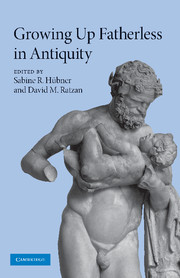Book contents
- Frontmatter
- Contents
- List of figures
- List of tables
- List of contributors
- Acknowledgments
- Note on abbreviations
- INTRODUCTION
- 1 Fatherless antiquity? Perspectives on “fatherlessness” in the ancient Mediterranean
- PART I COPING WITH DEMOGRAPHIC REALITIES
- 2 The demographic background
- 3 Oedipal complexities
- 4 Callirhoe's dilemma: remarriage and stepfathers in the Greco-Roman East
- 5 “Without father, without mother, without genealogy”: fatherlessness in the Old and New Testaments
- PART II VIRTUAL FATHERLESSNESS
- PART III ROLES WITHOUT MODELS
- PART IV RHETORIC OF LOSS
- Bibliography
- Index
3 - Oedipal complexities
Published online by Cambridge University Press: 30 July 2009
- Frontmatter
- Contents
- List of figures
- List of tables
- List of contributors
- Acknowledgments
- Note on abbreviations
- INTRODUCTION
- 1 Fatherless antiquity? Perspectives on “fatherlessness” in the ancient Mediterranean
- PART I COPING WITH DEMOGRAPHIC REALITIES
- 2 The demographic background
- 3 Oedipal complexities
- 4 Callirhoe's dilemma: remarriage and stepfathers in the Greco-Roman East
- 5 “Without father, without mother, without genealogy”: fatherlessness in the Old and New Testaments
- PART II VIRTUAL FATHERLESSNESS
- PART III ROLES WITHOUT MODELS
- PART IV RHETORIC OF LOSS
- Bibliography
- Index
Summary
It was King Cecrops who first founded marriage at Athens. As a result (according to Charax of Pergamum) he was called diphyēs, “two-natured,” because through him humans recognized that they were born of two beings. Charax, a historian who may have lived in the second century ce, knows another explanation for Cecrops' epithet, and there were more besides – that he was bilingual, that his temperament changed over time, that he was half-serpent and half-man – but the invention of so fundamental an institution as paternity is in line with his other associations. Cecrops is variously credited with being Athens' first king, with choosing Athena as his city's patron, with recognizing Zeus as the supreme god, with (less successfully) ending the sacrifice of living victims. We might regard him (as writers from at least the fourth century bce did) as a culture hero. Or even as the father of his country. After all, in one version of Athena's struggle with Poseidon to be recognized as the tutelary deity of Athens, Cecrops arranged a vote of the citizens. The women voted in a bloc for Athena and, more numerous as they were, narrowly carried the day. The men responded in a manner not unknown in respect to modern elections: they removed women's right to vote or to be called Athenians and, more pertinently here, decreed that children must be known by their father's name alone.
- Type
- Chapter
- Information
- Growing Up Fatherless in Antiquity , pp. 41 - 60Publisher: Cambridge University PressPrint publication year: 2009
- 8
- Cited by

